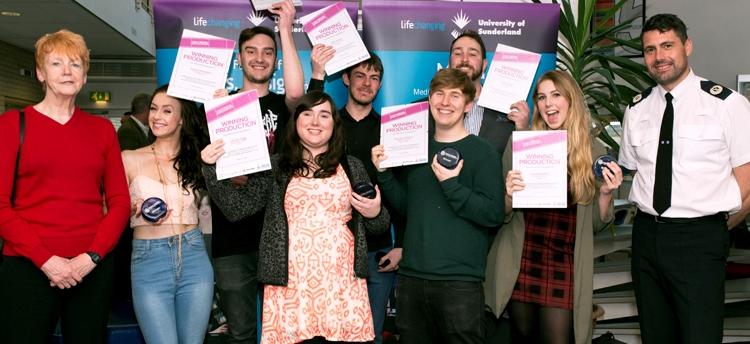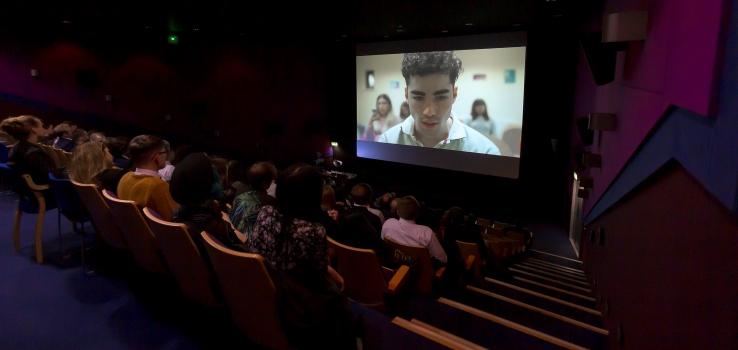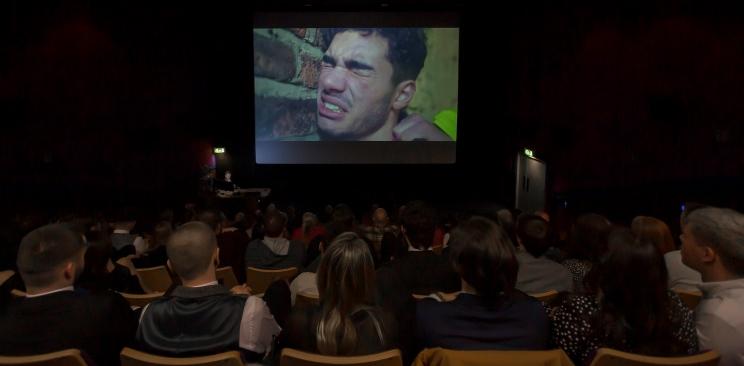The winning project
Since 2013, 500 students from the University of Sunderland have produced 23 films for Northumbria Police’s SARC. They address key issues of serious crime including capacity to consent, sexual exploitation, domestic violence, cyber-safety, modern day slavery and male rape.
The project is an embedded, assessed element for Performing Arts and Film Production degree programmes. Every student is given a role as either an actor or film-maker. The SARC team lead on setting the crime to be captured by the collaboration. The University ensure the work is assessed as part of the student’s programme.
The films are shared with SARC managers across the UK, amongst help centres, police training courses, schools, sixth forms and colleges. They are also distributed to wider agencies (Changing Lives, Sunderland Counselling Services, Slater & Gordon, Association of Chief of Police Officers), a wide variety of healthcare professionals and voluntary organisations.

Following six years of running this collaboration, alongside SARC manager Michelle Sheridan, I would like to share our ‘Seven Steps’ to running a successful collaborative project with external agencies.
Step One: Have an initial meeting between university academics and specialists from your external agency to establish the boundaries and future intentions of the projects as resources, alongside the support students may need. Consider integrating wider partners into the team each year, which will be pivotal to success. By getting this step right, our films have been able to successfully support the work of Northumbria Police in training officers.
The work shines ‘a much-needed spotlight on important issues and is an asset in raising awareness’ (Assistant Chief Constable Rachel Bacon, 2019).
The films are regarded as ‘excellent for police training purposes’ (Isle of Jersey SARC Manager, 2019), and our partners use the footage ‘whilst training police, probation, social services and many voluntary sectors…Having such footage embedded in our training to raise awareness to frontline staff has been extremely powerful’ (Debra Cowey, Service Manager Changing Lives, 2019).
Step Two: Following preliminary meetings between academics and wider partners, academics should meet to plan and embed the projects into curriculum delivery. We found that when the projects were voluntary we had less volunteers. When the projects were embedded within the curriculum, the outcomes were much more successful. By embedding opportunities of this nature into the curriculum we can offer students employment-level experiences, in advance of graduation, that go beyond end-point assessments. This has had a positive effect on graduate employability.
Ross Scott, BA (Hons) Drama, now training with the Bridge Theatre Training Company, stated,
"The film has helped me progress into a professional industry and it is on my showreel for agents and casting directors to view. Without this fantastic opportunity my showreel wouldn’t be half as strong, and my experience as an actor wouldn’t be half as broad."
Glen Harris BA (Hons) Digital Film graduate (2016) and producer for Damaged Goods, about sexual exploitation, is now a videographer and editor in London. He explained:
"Whilst the typical university modules seemed to teach us theoretical and practical creative techniques to implement within a short film, producing a film for Northumbria Police’s SARC with specific aims and objectives was perhaps the first time I got a taste for what it’s like to work on a client’s brief. It definitely gave us a more ‘real-world’ experience whilst also being in the ‘safety-net’ of the university environment. It helped to lay the foundation of the way in which I now approach my freelance work, and being able to state that we produced an award-winning film is always good to have on the CV."

Step Three: Ensure external agents visit the students and are part of the module delivery. Our partners are scheduled to visit four times throughout a 13-week module. These visits allow for deeper discussions surrounding specific crime issues, feedback on drafts of work, and exploration of client expectations. Key to this is providing expert advice for students in order to help create believability within the films.
Step Four: Make sure the students are consistently supported. We hold weekly tutorials which alternate between assessment and client-focussed discussions. This allows the students to discuss any issues arising, watch drafts, and agree points of developmental progression.
Step Five: Make sure the project develops the way it needs to by inserting interim viewing of the work. This is an important time for the students to receive formative feedback on their work, which they can reflect upon in other areas of assessment (e.g. viva, log books). It is important for students to hear and act upon points of development, before moving into a summative assessment. This formative stage should include feedback from peers, those running the module, and the external agents collaborating on the project.
Step Six: Ensure you have funding for the projects. Our productions are part-financed by the Police Crime Commissioner’s Community Fund and by the University, allowing for the continuation of the projects.
Step Seven: Find an occasion to celebrate the student’s work and the success of your collaboration. Our projects are screened annually before an audience of invited guests, including delegates from Northumbria Police and its SARC. Formal recognition and reward of the students work raises motivation significantly.

These steps were what worked best for us and remain a blueprint for each year’s collaboration.
Our work has proven valuable to all involved, and I would encourage anyone to run a project of this nature. This is important work, and we are proud to be able to make a difference.
What steps did you take in order to run a collaborative project?
Read more about our CATE project and please keep an eye out for our 2020 films addressing the issue of County Lines.
Dr Adelle Hulsmeier is the programme leader for Screen Performance at the University of Sunderland.